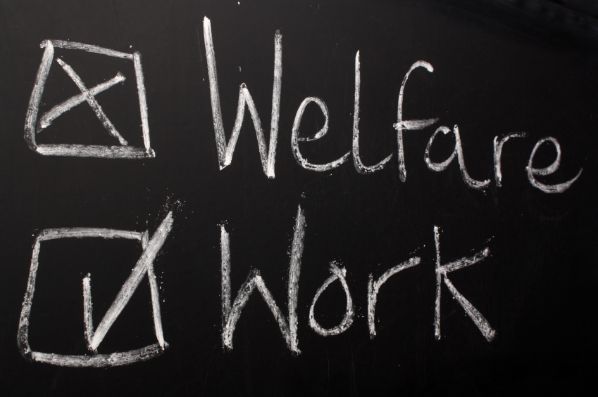With Maine’s gubernatorial election only three months away, welfare policy has become a central campaign issue. Republicans are touting Governor Paul LePage’s reforms as revolutionary and effective, while critics claim that his focus on welfare has galvanized his base but scared away moderate and liberal voters.
LePage won his 2010 race vowing to address the state’s low per capita income and high per capita welfare use. On the campaign trail, he used his own story — as a boy, LePage was homeless — to claim unique insight into the problem of poverty in Maine.
Since taking office, LePage has presided over several noteworthy but controversial reforms. During the recession, Maine, along with 32 other states, had received a work-requirement waiver from the federal government, on the basis of high unemployment and few job opportunities. But last week, LePage said he was ending the waiver era and reinstating the work requirement for food-assistance benefits, given that the unemployment rate had fallen to 5.5 percent.
As Patrice J. Lee of the Independent Women’s Forum wrote, “That means adults 18 to 49 years old who have no dependents, are not pregnant, and are not disabled must either work at least 20 hours a week or volunteer for a community agency.” The state Department of Health and Human Services tells National Review Online that the public’s reaction to the announcement about the work requirement has been overwhelmingly positive.
The governor also implemented a five-year cap on Temporary Assistance for Needy Families (TANF) cash benefits, which has resulted in a 41 percent reduction of the program. The number of welfare-fraud prosecutions has quadrupled under his tenure, and this month, photos became a requirement on all electronic-benefits transaction (EBT) cards in the state, another program aimed at reducing abuse of benefits. Meanwhile, Republican state legislators have repeatedly introduced welfare-reform legislation, which they say has been voted down along party lines.
Mary Mayhew, commissioner of the Maine Department of Health and Human Services, tells NRO: “I believe [welfare reform] resonates because people have been frustrated both in terms of the abuse of the welfare programs that they have personally seen, and because they are frustrated with the lack of personal accountability and the lack of a commitment to a work ethic.”
Brent Littlefield, a strategic consultant for the LePage reelection campaign, agrees, saying that welfare reform has become a key campaign issue in part because it affects so many Maine residents. “Maine has expanded welfare beyond what many states had done over the past many years, and above the federal poverty guidelines,” Littlefield says. “You have a lot of people . . . working-class people, professional-class people . . . who are working very hard and have seen this expansive growth of welfare. They’re seeing other people who are, in their minds, able-bodied people who are capable of working — but they’re not. I think it has upset people’s sensibilities, and that’s the big reason it’s become such an issue in the state of Maine.”
Nevertheless, LePage is now facing a tough reelection fight, trailing his top opponent, Democrat Mike Michaud, in most recent polls. Littlefield warns that Michaud would “likely work to reverse those [welfare] changes.” Meanwhile, many opponents of LePage’s reforms say they may come back to haunt him in November.
Sara Gagné-Holmes, executive director at Maine Equal Justice Partners, tells NRO that she thinks LePage’s tough reforms have off-put many voters. “The tide is changing, the rhetoric has become too harsh, and the villainization of the poor has become too severe,” Gagné-Holmes says. “But again, it depends on your ideology and how you vote. . . . I don’t think it’s the primary issue [this gubernatorial race], but I think it’s definitely a close second or third because everything’s being tied to it: ‘If we didn’t have these programs, we could do x; if we diverted funding from these programs, we could do y.’”
Likewise, Garrett Martin, executive director of the Maine Center for Economic Policy, says: “I think it’s been shown through polling that the governor’s support base seems to hover somewhere between 33 and 39 percent. For that segment of the voting public, I think [welfare reform], for the governor, is a winner. Among the other 61 to 67 percent of folks who have not indicated their support for the governor, I suspect this may be one of the reasons why they’re less likely to support the governor.”
But the state’s Republicans still say they still believe welfare reform is a winning issue. In June, they launched a welfare-reform ad campaign, which highlights what they say is Democratic obstructionism against meaningful changes to the programs.
David Sorensen, communications director for the Maine Republican party, tells NRO that this election presents a chance to hold Michaud — he has served as a U.S. representative since 2003 and was in the Maine legislature before that, beginning in 1980 — accountable for the growth of welfare use within the state.
“Really this election is about reform versus the status quo,” Sorensen says. “It’s about Governor LePage shaking things up and pushing his reforms, and Michaud and the Democrats defending the status quo that they created at all costs.”
— Jillian Kay Melchior writes for National Review as a Thomas L. Rhodes Fellow for the Franklin Center. She is also a senior fellow at the Independent Women’s Forum.


